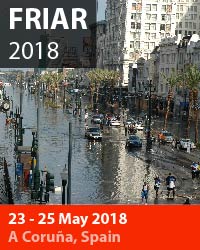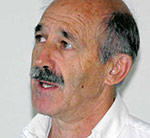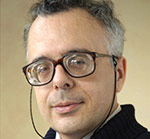FRIAR 2018
6th International Conference on Flood and Urban Water Management
![]()
23 - 25 May 2018
A Coruña, Spain
Overview

The sixth International Conference on Flood and Urban Water Management took place in A Coruña, Spain, co-organised by Wessex Institute, University of A Coruña, Birmingham City University and Polytechnic of Milan. The conference represented by Professors Santiago Hernandez and Stefano Mambretti, both Directors of WIT, Professor David Proverbs of Birmingham City University and Professor Jeronimo Puertas of the University of Coruña.
The meeting was sponsored by WIT Transactions on Ecology and the Environment and the International Journal of Safety and Security Engineering.
Located in the verdant agricultural region of Galicia, La Coruña is home to Roman remains, castles, museums and sumptuous produce markets, and is perhaps most famous for its excellent fish and seafood. A new promenade frames the waterfront, extending the length of the city and linking its many attractions, shopping areas and beaches. The nineteenth-century centre is noted for its unusual Galerias – glazed balconies on the front of the buildings - which allow the city’s residents to enjoy the Atlantic views year round. A landmark of the city, the 2,000-year-old tower of Hercules is the oldest lighthouse in existence, a World Heritage site and National Monument of Spain.
Flooding is a global phenomenon which each year claims numerous lives worldwide. When flooding occurs in urban areas, it can cause substantial damage to property as well as threaten human life. The increased frequency of flooding in the last few years, coupled with climate change predictions and urban development, suggests that these impacts are set to worsen in the future. How we respond and adapt to these challenges is key to developing our long-term resilience at the property, community and city scale.
Apart from the obvious physical impacts of floods, there are other indirect losses which are often overlooked. These are associated with disruption to normal life as well as longer-term health issues, such as community displacements and stress-related illnesses. Vulnerable communities are often exposed to sudden and life-threatening events.
FRIAR sought to develop an improved understanding of emerging flood risk management and urban water management challenges.
Opening of the Conference
Santiago welcomed the delegates to the city and explained the logistics of the conference. He then gave a presentation of WIT’s activities, including the numerous conferences and journals, followed by a description of the research carried out at the Institute. He illustrated the importance of these meetings to fulfil the objectives of the Institute, as the dissemination of knowledge. This is carried out in different ways, in addition to courses and conferences and carrying out R&D work for industry and the publication of scientific papers and books. He also mentioned the Medals and Awards, given every year to exceptional scientists, which include the Prigogine Medal after the late Nobel Prize Ilia Prigogine.
The Institute has launched a series of Journals and some are very relevant to the FRIAR conference such as the International Journal of Safety and Security Engineering, a collaboration between the Institute and the University of Rome. Urban Water issues may also be addressed by the International Journal of Sustainable Development and Planning or the International Journal of Environmental Impacts.
WIT is committed to the dissemination of scientific information. Because of that, it was decided to make all the papers published by the Institute Open Access through its associated company WIT Press. Papers can now be downloaded from the Institute’s eLibrary for free (https://www.witpress.com/elibrary), and the Institute encourages the dissemination throughout the world.
David Proverbs addressed the conference in the name of the co-organising Institution, Birmingham City University, where he is Associate Dean of International Affairs. David is also a Fellow of the Royal Institute of Chartered Surveyors and Fellow of the Chartered Institute of Building. In addition, he has over twenty years’ experience in Flood Risk Management and is Co-Editor of the Structural Survey Journal of Building Pathology and Refurbishment.
David referred to the history of the meeting which originated in London, where it was held in association with the Institution of Civil Engineers. Since then the Conference has been reconvened in different locations throughout Europe and has always been very successful in bringing together people from different countries and backgrounds.
In his opening address, David also referred to the importance of the urban water infrastructures that, as our cities continue to expand, need to be re-evaluated and adapted to new requirements related to the increase in population and the growing areas under urbanization. This series of Conferences also considers these problems and deals with two main topics: water supply systems and urban drainage.
He stated the importance of international collaboration in the field of Flood Risk Management and the need to cooperate across national boundaries. In this regard the success of the Risk meeting to attract people from so many different parts of the world is a major advantage.
The fundamentals of Flood Management has recently changed, with more emphasis being put into working in harmony with nature, taking advantage of the landscape and wetlands to regulate water flows and prevent floods.
Invited Speakers
The Conference programme included a series of invited presentations by well-known colleagues, starting with the keynote address by Jessica Lamond, University of the West of England, UK entitled “The evidence base for property flood resilience”.
Other invited presentations were as follows:
- “Towards a conceptual framework for property level flood resilience”, by David Proverbs, Birmingham City University, UK.
- “Field study of SS discharge from combined sewer system of highly urbanized area”, by Tadaharu Ishikawa, Tokyo Institute of Technology, Japan.
- “Proposition of fractal dimension application for the estimation of water delivery certainty”, by Dariusz Kowalski Lublin University of Technology, Poland.
- “A physically-based approach for evaluating the hydraulic invariance in urban transformations”, by Roberto Magini, University of Rome-La Sapienza, Italy.”
- “Evaluating the suitability of Airbus worldDEM for flood modelling in data-scarce regions: the case study of the Megaruma river in Mozambique”, by Maria Bermudez, University of A Coruña, Spain.
- “Simulation of chlorine concentration changes in a real water supply network using Epanet 2.0 and WaterGems software packages”, by Beata Kowalska, Lublin University of Technology, Poland.
- “Towards complete property-level flood protection of domestic buildings in the UK”, by Jessica Lamond, University of the West of England, UK.
- “Problems of rainwater management in the city on the example of Warsaw”, by Jaroslaw Chudzicki, Warsaw University of Technology, Poland.
- “Problems, perceptions and solutions to increased flooding threats in urban areas in the Pacific Northwest, USA”, by Robert Mahler, University of Idaho, United States.
- “Infiltration-exfiltration system for stormwater runoff volume and peak attenuation”, by Gianfranco Becciu, Politecnico di Milano, Italy.
- “Impact analysis of the precision of mapping the operational conditions of the water supply system on the accuracy of the hydraulic model calibration”, by Izabela Zimoch, Silesian University of Technology, Poland.
- “Flood damage assessment”, by Martina Zelenakova, Technical University of Kosice, Slovakia.
Excursion
On the afternoon on the first day of the conference, an excursion was arranged to the University of A Coruña. The Center for Technological Innovation in Construction and Civil Engineering (CITEEC) was created with the purpose of improving investigation and research in the field of construction, specifically civil engineering, from an experimental analysis approach.
CITEEC currently supports ten areas of activity, represented by these laboratories:
- Construction Laboratory
- Laboratory of Hydraulics
- Laboratory of Instrumentation and Intelligent Systems in Civil Engineering
- Laboratory of Numerical Methods in Engineering
- Laboratory of Ports and Coasts
- Laboratory of Railway Engineering and Transport
- Laboratory of Roads and Geotechnics
- Laboratory of Rock Mechanics
- Laboratory of Sanitary and Environmental Engineering
- Wind Tunnel Laboratory for Aeroelastic Testing
Every laboratory generates their own projects and uses their own equipment and facilities, which are all part of the center.
CITEEC is directly linked to the University of A Coruña and was created in 2000 (inaugurated on June the 6th, 2000). CITEEC develops three key areas of activity, coinciding with the three pillars of university research:
- Promotion of basic research: Conducting studies to expand knowledge in all fields related to civil engineering. The realization of doctoral theses and degree dissertations is the mechanism that promotes this kind of research, closely linked to the university departments.
- Applied research: Using any of the usual mechanisms for raising funds for research (Autonomous Region government, Ministry for Science and Education, EU), the CITEEC serves as a support for research projects in collaboration with companies and agencies.
- Consultancy to companies and institutions: The CITEEC is a very remarkable framework, unique in the Autonomous Region of Galicia, available to businesses and institutions through cooperation agreements to support the implementation of projects or activities that require physical model studies, or infrastructure studies in detail.
Conference Dinner
The Conference dinner took place at Restaurant Domus, situated inside the Domus Museum, and offers wonderful views of the bay and city of A Coruña. The delegates were treated to traditional Galician food and fine local wines. A quartet of Galician folklore musicians composed by two bagpipes and two drums interpreted sons of Celtic origin provide entertainment in the dinner.
The International Scientific Advisory Committee of the conference met over dinner in a local restaurant. The organisers thanked the committee members for their help in reviewing abstracts and papers, thus ensuring the high quality of presentations. New conference topics were discussed, as well as future locations.
Closing of the Conference
The meeting was closed by Professors Stefano Mambretti and Jeronimo Puerta who expressed their appreciation to the delegates for having participated in FRIAR 2018 and hoped that they would consider attending the next meeting in the series.
Related Conferences
SDP 2018, 4 - 6 September 2018
Disaster Management 2019, 25 - 27 September 2019
Water Resources Management 2019, 7 - 9 May 2019
SAFE 2019, 23 - 25 September 2019




 Wessex Institute
Wessex Institute